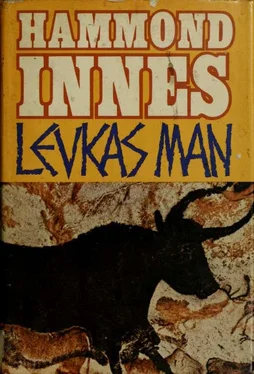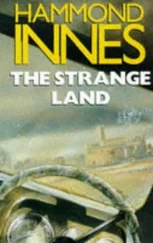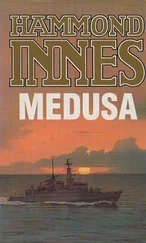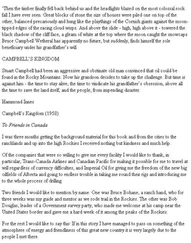Hammond Innes - Levkas man
Здесь есть возможность читать онлайн «Hammond Innes - Levkas man» весь текст электронной книги совершенно бесплатно (целиком полную версию без сокращений). В некоторых случаях можно слушать аудио, скачать через торрент в формате fb2 и присутствует краткое содержание. Жанр: Прочие приключения, на английском языке. Описание произведения, (предисловие) а так же отзывы посетителей доступны на портале библиотеки ЛибКат.
- Название:Levkas man
- Автор:
- Жанр:
- Год:неизвестен
- ISBN:нет данных
- Рейтинг книги:3 / 5. Голосов: 1
-
Избранное:Добавить в избранное
- Отзывы:
-
Ваша оценка:
- 60
- 1
- 2
- 3
- 4
- 5
Levkas man: краткое содержание, описание и аннотация
Предлагаем к чтению аннотацию, описание, краткое содержание или предисловие (зависит от того, что написал сам автор книги «Levkas man»). Если вы не нашли необходимую информацию о книге — напишите в комментариях, мы постараемся отыскать её.
Levkas man — читать онлайн бесплатно полную книгу (весь текст) целиком
Ниже представлен текст книги, разбитый по страницам. Система сохранения места последней прочитанной страницы, позволяет с удобством читать онлайн бесплатно книгу «Levkas man», без необходимости каждый раз заново искать на чём Вы остановились. Поставьте закладку, и сможете в любой момент перейти на страницу, на которой закончили чтение.
Интервал:
Закладка:
I went in and opened up the suitcase. But all it contained was clothes-no notes, not even any books. Whatever he had learned on the way down through Macedonia was locked away in his head.
I went down to the river then and lay for a while in the warm sun, listening to the sound of the water. It was a relief to be on my own in the quiet of the Greek countryside instead of cooped up in that car with the smell of Kotiadis's cigarettes and his explosive talk. I took my clothes off and waded into the water. It was almost knee-deep, running fast over flat, worn stones, and at the deepest part I plunged myself into it, clinging to the bottom and letting it wash over me. It was clear, sparkling water, very cold, and I came out refreshed to lie on the grass again and dry out in the sun. The bathe had relaxed me and my mind felt clearer. If I had known enough about anthropology to understand what was in the old man's mind, what this cave-shelter meant to him … I closed my eyes, soaking up the warmth of the sun, thinking of Cartwright and Hans. There was the girl, too. She had been here four days, and she knew the old man better than any of us. In four days she must have discovered something. Kotiadis was probably right. If I stayed here a day or two, living with them in the camp, perhaps working with them on the dig, sooner or later I would discover what had really happened.
After a while I put on my clothes again and went back to the camp. I would have gone up to the dig then, but I needed
a sweater and the corporal had put my case outside the mess tent. The flap of the tent was open and in the blue interior of it was a folding table with two canvas chairs. There was a pressure lamp on the table, and amongst a litter of books and papers, I saw a pocket mirror, comb, hairbrush and powder compact. Sonia had been using it as a dressing table and her sleeping bag was laid out on the grass at the back.
I ducked my head and went in. The papers were notes-notes on the books she had been reading. Two of them were open-a little British Museum booklet called Man the Tool-Maker and a much bigger volume, Hiindert Jahre Neander-thaler. The other books, four of them, were also anthropological. One in particular caught my eye: Adventures with the Missing Link by Raymond Dart. There was also a typewritten article by E. S. Higgs dealing with A Middle Palaeolithic Industry in Greece. I skimmed this through, and then, intrigued by the title, I took Adventures with the Missing Link and one of the canvas chairs out into the sunshine and began to read.
It was just curiosity, no more-an excuse to sit in the sun and do nothing except enjoy the stillness and the emptiness of the olive grove. It never occurred to me that I should enjoy it, that I should become so engrossed in a book on anthropology that I should lose all sense of time. But this told of the first discoveries that proved man had originated in Africa. It was a fascinating story, written in a language I could understand, and though the setting was much further south than Kenya, it brought back something of my own childhood.
In 1924 Raymond Dart had been shown the fossilized skull of a baboon. He was an Australian who had recently taken the chair of Anatomy at the little-known University of Witwaters-rand. The skull, brought to him by a young girl student, had come from limeworks at a village called Buxton on the edge of the Kalahari desert, and it was the first of a whole series of discoveries that led him ultimately to the conclusion that the evolution of man from primate ancestors had begun, not in Asia, as was then generally thought, but in Africa. This first
discovery was followed almost immediately by a consignment of fossil-laden rocks, two of which were complementary. From these two Dart pieced together the skull of a six-year-old primate with a small ape-sized brain and a facial appearance that was almost human. This became known as the Taung skull, after the railway station nearest to the point where it had been blasted out of the limestone.
The man-ape child had lived in the early Pleistocene period, about a million years ago, and the form of the skull made it clear that it was a true biped and had walked upright. Moreover, the teeth, which were like human teeth, proved beyond doubt, to Dart at any rate, that it had been a carnivore. In other words, about a million years ago, in Africa, environment had developed a breed of killer apes that had branched off from their arboreal ancestors; they had taken to the ground, standing erect, and had used bone weapons instead of teeth for hunting,
A slip of paper had been inserted as a marker at chapter two and somebody, presumably Sonia, had underlined the opening paragraph: For many years after the news of my find was presented to the worlds I was to be accused of being too hasty in arriving at the definite conclusions I had formed after studying the skull, teeth and endocranial cast for a matter of only four months.
The major part of the book concerned Dart's work on limestone breccia from the Makapansgat Valley in Northern Transvaal. In fourteen years 95 tons of bone-bearing breccia were recovered from thousands upon thousands of tons of limestone dumped by the quarries, and each of those 95 tons had yielded an average of 5,000 fossil bones. From these he had reconstructed, not only the appearance, but the whole way of life of the early man-ape, proving that his development had been associated throughout with the use of weapons.
It read like a detective story, the bones, so carefully chipped from their limestone matrix, acting as the clues, for these man-apes accumulated only those remains of their prey that were useful to them as weapons or tools. They had even
inserted teeth or sharp slivers of bone into the larger bones they used as clubs to give an edge to them, and they were already essentially right-handed.
The sun had dropped below the hills and it was getting chilly when I reached the chapter entitled-T/i(? Antiquity of Murder. It showed the man-ape as a killer and an eater of his own, as well as other, species, and I was just considering this in relation to what Gilmore had told me about the old man's Journal when I became conscious that somebody was standing behind me. I turned. It was Sonia.
"That's mine," she said possessively.
"I thought it probably was."
"It never occurred to me. ."
"What?"
"That you read-books, I mean."
"Only the lighter ones." I closed the book and held it up so that she could see the title. "This man Dart-he's like a sort of anthropological private eye."
"Raymond Dart," she said coldly, "is probably the most outstanding anthropologist since Darwin."
"Well anyway, he makes it interesting."
"Really-to you?" She smiled. "That's probably because it was written in collaboration."
"Then it's a pity more anthropologists don't collaborate with somebody. Here he is, rattling his old fossil-bones, making deductions nobody believes in-"
"I suppose you mean the Taung skull-Australopithecus africanus."
I stared at her and then burst out laughing. "Is that meant to encourage me? Why the hell can't you call it a man-ape child like he does? Then we know what we're talking about." I opened the book at the marker paper, pointing to the first paragraph of chapter two. "Did you underline that?"
"No." She was leaning down over my shoulder. "It was like that when he gave it to me."
"Who-the old man?"
"Dr. Gilmore."
"He'd marked it, had he?"
"I suppose so."
"Why did he give it to you?"
She hesitated, frowning. "I don't quite know. He bought it for me especially at a bookshop in Amsterdam. I knew all about Dart, of course. But I hadn't read this book. He said it might interest me. That was all. I don't know why."
"You've read it, have you?"
"Yes, of course. I read it straight away. And then again in the plane coming over."
Читать дальшеИнтервал:
Закладка:
Похожие книги на «Levkas man»
Представляем Вашему вниманию похожие книги на «Levkas man» списком для выбора. Мы отобрали схожую по названию и смыслу литературу в надежде предоставить читателям больше вариантов отыскать новые, интересные, ещё непрочитанные произведения.
Обсуждение, отзывы о книге «Levkas man» и просто собственные мнения читателей. Оставьте ваши комментарии, напишите, что Вы думаете о произведении, его смысле или главных героях. Укажите что конкретно понравилось, а что нет, и почему Вы так считаете.












